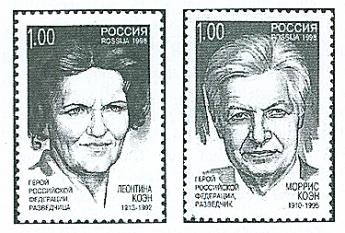Antiquarian Booksellers' Association Omega Bookshop
ABA Members on Postage Stamps (No. 1 in a very short series)

By Angus O'Neill
Peter J. Kroger, of Ruislip, was not an ABA member for very long: the minutes of the General Committee say no more than ‘(October 1960) (Removed from membership April 1961)’. He and his wife Helen ran a modest catalogue business from their bungalow, 45 Cranley Drive, between 1954 and 7 January 1961, when a visit from Superintendent George `Moonraker' Smith, of Scotland Yard, put an abrupt end to their bookselling - and other - activities.
Although he claimed to be Canadian, Kroger (1910-1995) was in fact a New Yorker of Ukrainian and Lithuanian descent, whose real name was Morris Cohen; his wife, Leontina or Lola (1913-1992; nee Petka) was born in Massachusetts of Austrian parents. They began working for Soviet intelligence in the late 1930s, and are now best known for their part in passing Manhattan Project (i.e. atom bomb) secrets to the Russians, and (later) for their involvement in the Portland Spy Ring, which had penetrated the Royal Navy. Their bungalow housed a radio transmitter, printing and photographic equipment, false passports, and a lot of cash; it transpired that many of the books they posted overseas had contained microdot reductions of secret documents.
Convicted and imprisoned, they were exchanged for an English prisoner in 1969, and lived the rest of their lives in Moscow, receiving numerous decorations and a KGB pension, and generally helping the cause - although it would be good to know why the FBI sent their photographs and fingerprints to Berne in 1970, and their entire files to both Hong Kong and Manila in 1972 ...
O.F. ('Fred') Snelling gives an entertaining and sympathetic account of his relations with them in “Rare Books and Rarer People” (London: Werner Shaw, 1982). Indeed, his account is perhaps a little too sympathetic: the 'Krogers' were evidently good hosts, and popular in the antiquarian book trade; but it is clear, even from those of their activities that we know about, that they were very successful spies indeed, and the records of the FBI (declassified, for the most part, in 1985, and now online, although with extensive 'redaction') indicate that they were being actively sought throughout the 1950s.
Their portraits appeared on Soviet postage stamps in 1998 and are, as far as I know, the only representation of any ABA member in this format. Unless, of course, you know different ...
(Published in the ABA Newsletter, April 2013. Presented here by permission of Angus O’Neill. Thank you very much.)
